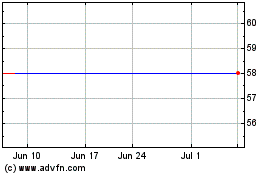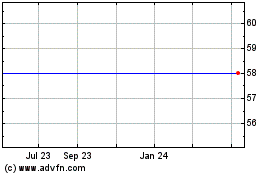By Matthew Futterman
Less than three months after Comcast Corp.'s NBCUniversal
committed to spend about $950 million to air English Premier League
soccer games in the U.S., the deal is starting to look like a rare
commodity in the hot market for sports rights: a bargain.
In August, when the media company announced the new deal, which
extends an earlier partnership and spans the 2016-17 season through
2021-22, NBC Sports Chairman Mark Lazarus predicted the company
wouldn't make money on the transaction, positioning it more as a
loss-leader that would support the broader NBC sports
portfolio.
But as the U.S. audience for the Premier League surges, he
already is hedging those comments, saying in a recent interview:
"We won't make money at the beginning." Premier League matches are
just about the only major sports property in the U.S. showing any
significant long-term growth in a splintering media environment in
which executives declare victory when audience sizes remain flat or
dip only slightly.
NBCUniversal, which has owned Premier League rights since 2013,
outbid 21st Century Fox Inc. and BeInSports--a spinoff of Qatar's
Al Jazeera Media Network--in the most recent Premier League
bidding.
Thus far, in the third and final season of NBCUniversal's
original $250 million Premiere League deal, matches are averaging
563,000 viewers each across all channels, a 19% increase over last
year. Matches mostly are shown on Saturday and Sunday mornings
between 7 a.m. and 2 p.m. Eastern Time on the NBC Sports cable
channel, but also now appear regularly on the NBC broadcast network
and other channels the company owns, such as USA.
By comparison, Major League Soccer games garnered an average
audience this season of about 200,000 on FoxSports1 and about
250,000 on ESPN's channels. On average, television audiences for
MLS games have seen limited growth in recent years.
A spokesman for NBC Sports said most viewers watch Premier
League matches live, though on the West coast, where the earliest
contests air at 4 a.m., more recorded viewing does occur.
Audience size has risen 150%, on average, compared with three
years ago when the games were on Fox and ESPN, which is majority
owned by Walt Disney Co. In addition, fans have streamed 139
million live minutes of NBC Sports digital coverage this season,
which began in August, 44% more than the same period last year.
"I think they have come up with a cost-effective, NFL-style
package," said sports media consultant Lee Berke. "It's like
finding a sleeper draft pick in the fifth or sixth round and
realizing this could be your franchise quarterback."
The Premier League still has a long way to go to rival the top
U.S. sports leagues in popularity. The National Football League,
Major League Baseball and the National Basketball Association still
attract far larger audiences.
For example, ESPN's telecasts of Major League Baseball games
have averaged about 1.25 million viewers each the past three
seasons. However, audience sizes for national, regular-season
baseball games are nearly 40% lower than they were a decade ago,
and the average baseball viewer is about 56 years old.
In addition, under its new deal, ESPN is paying MLB $700 million
a year in rights fees, more than four times what NBCUniversal will
pay the Premier League. The Premier League audience is about 38
years old on average, among the youngest in major televised sports
and a demographic advertisers covet.
Sports media experts say they are more bullish about the future
of the Premier League in the U.S. than they are about any other
league, with the exception of the long-dominant NFL. Sunday
football games on CBS and Fox routinely attract some 20 million
viewers.
Frank Hawkins, a founder of New York-based consulting firm
Scalar Media Partners LLC and a former NFL executive, said
continuing shifts in the U.S. population and its tastes have led
him to believe that the Premier League may eventually become the
second-most watched sport in the U.S. behind the NFL. He cited the
growing immigrant and Hispanic populations, the declining
participation in youth football and baseball, and soccer's
popularity among both men and women.
"In the past, soccer being big in the U.S. was measured by the
popularity of its domestic league," Mr. Hawkins said. "That's not
true anymore."
NBC's game coverage is led by Arlo White, a Briton who had
covered American football from the U.S. for the British
Broadcasting Corp. and did play-by-play for the Seattle Sounders of
Major League Soccer beginning in 2010. Former Premier League
players Lee Dixon and Graeme Le Saux provide color commentary.
Standing in the media gantry high above the field at a recent
Chelsea-Arsenal showdown at London's Stamford Bridge stadium, Mr.
White said success now lies in finding the balance between teaching
the game to more sophisticated U.S. fans without being patronizing
or using soccer phrases popular in the U.S. but nowhere else.
"I'll never say 'upper-90' or 'PKs,'" he said, rolling his eyes
at the American vernacular for the top corner of the goal or a
penalty kick.
NBC Sports says it sees opportunities to use Premier League
matches to lead into the rest of NBC's weekend sports coverage and,
like the Olympics, believes it can help secure increases in
carriage fees pay TV distributors pay for its channels.
According to media-research firm SNL Kagan, the NBC Sports
Network, which is in 83 million homes, receives just 30 cents a
month for each subscriber from cable companies and other
pay-television distributors, compared with 98 cents for FoxSports1
and $6.64 cents for ESPN.
The new deal also gives NBC the option to sell the matches for
customers to watch online and to license digital clips of the
matches.
Write to Matthew Futterman at matthew.futterman@wsj.com
Subscribe to WSJ: http://online.wsj.com?mod=djnwires
(END) Dow Jones Newswires
October 28, 2015 17:17 ET (21:17 GMT)
Copyright (c) 2015 Dow Jones & Company, Inc.
Comcast (NASDAQ:CMCSK)
Historical Stock Chart
From Jun 2024 to Jul 2024

Comcast (NASDAQ:CMCSK)
Historical Stock Chart
From Jul 2023 to Jul 2024
